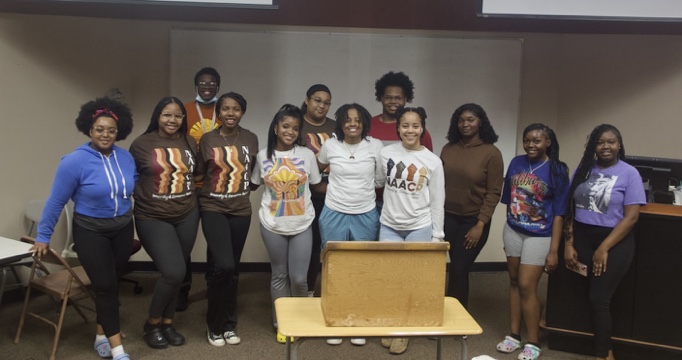Students spoke life into poetry while highlighting Black voices at the NAACP Poetry Slam. In honor of Black History Month, the NAACP hosted a poetry night that welcomed all. This inclusive meetup gave students a chance to express their hopes, fears and dreams through spoken word.
NAACP Advisor Erick Burton gave a moving speech on the importance of Black history and how expression has allowed for change over the years. Poetry, over time, has provided a space for expression during oppression, serving as an outlet for those to show their emotions. Burton described how less than forty years ago, former professors were having difficulties teaching in Louisiana.
“Poetry is something that many of the greats before us did, such as Dr. Maya Angelou and Langston Hughes,” Burton said. “That legacy continues through our students today. I want students to express how they feel through their talents and their gifts.”
Many students used poetry by former authors to shed light on their experiences. NAACP Vice President Issys Page recited a poem by Russel Kelfer, describing the intricacy and beauty of everyone. The poem articulated how God called for a perfect and unique design of each person. She explains why speaking about the past is integral for healing.
“Just being able to pause and remember the stories of our heroes, such as James Meredith or MLK, is important to me,” Page said. “Knowing they endured suffering and sacrificed so much for the sake of equality means a lot to me.”
Some students took the opportunity to speak from their own heart, like junior psychology major Lanaya Bolden. She recited an original piece based on a dream, expressing the importance of taking advantage of the moment. She explained why poetry has always been important to her community.
“Our ancestors created so many beautiful things because when you are oppressed, you have to find creative ways to thrive,” Bolden said. “That’s why I believe that the Black community has created some of the richest and most influential forms of expression. They found ways to defy what was trying to define them.”
A common theme of discussion among attendees was the regrettable end of Black celebration that appears to come at the end of each February. Bolden explained that she is proud to be Black every day of the year, and that the celebration of her culture should not end on March 1. The NAACP advocates for the consistent recognition of Black culture because of its profound influence on society, art, music and literature. Black heritage should not be bound by time constraints, and it deserves to be celebrated year-round.



